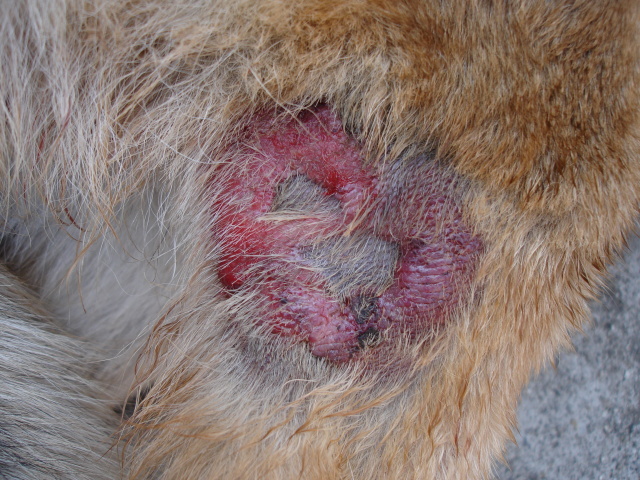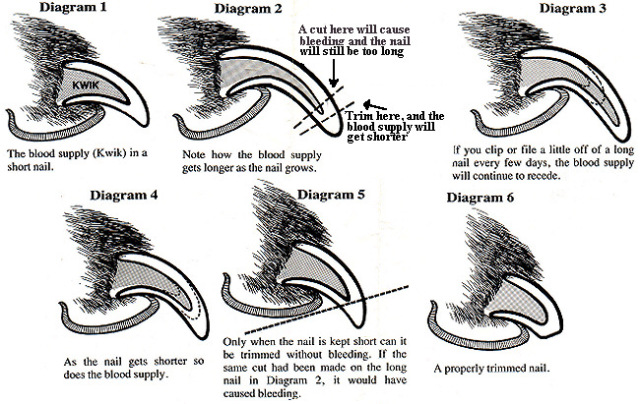QuestionOur 11 1/2 year old male Beagle started licking and chewing his paws at least 4 months ago. It seems like they itched and after so much licking and chewing they became red, inflamed, raw and sore. He has been back and forth to our vet probably 5-7 times already. The first thing he did was blood work which showed his thyroid was slightly low so he did another thyroid test which came back normal. He started him on antibiotics, didn't work, then prednisone which seemed to help a little but then back to licking and biting. Then he scraped a little bit off his pad and saw yeast so he was on yeast medicine for almost 10 days. He couldn't tolerate the medicine as he was lethargic, shaking, no appetite so the vet took him off of that. Finally skin biopsies were done which did not indicate yeast but some long list of minor things from his hair not growing properly to I don't know what else, however, the vet was not concerned. It mentioned we should take him to a vet that specialized in dermatology. All of a sudden they started to heal for not apparent reason. He slowly stopped licking, chewing and biting and all was fine. He hasn't done any of the licking or chewing for over a month. Then out of the blue he developed diabetes. The initial blood work, sugar was high normal but after we noticed him drinking excessively and urinating, we took him back and his sugar was 500. He's now on 15 units of insulin twice a day. Almost a week ago he started the licking and biting all four paws for no apparent reason. His poor paws mostly on the bottom between the pads are so red and sore to touch. The vet doesn't know what to do at this point. He said to put the cone/hat on him and stop at the office for some spray. He's worried they will become infected. They also bleed occasionally. Not a lot, just little spots of blood on the floor here and there. We haven't changed anything in the house. Haven't used any new cleaning products. He only goes outside to do his "business" and comes right back in. He's not exposed to salt or chemicals in the grass.
Now another week has gone by and he seems to be getting worse. His front right paw/leg is swelling and he's on Cephelexin. I just got back from the vet who put him on a stronger antibiotic and pain medicine. The poor dog lays around all day miserable and shaking. I'm not ready to put him to sleep but can't spend much more money on a specialist which is 2 1/2 hours away. I asked the vet to run some more lab work to see if anything has changed. My vet thinks the swelling is due to infection and he also has an odor which he also thinks is infection. He hasn't licked or chewed because of the cone/hat and his paws look worse. He also lost another 2 lbs but is eating twice a day. My heart is breaking and I just think there has to be an answer. It's only his paws, nothing on his body.
Sorry this is so lengthy, however so many things have gone on and tried, I wanted to fill you in with as many facts as possible. We have spent a fortune on the poor dog which is fine with me but my husband has had enough!
Thanks in advance for any ideas you may have.
Thank you,
Mrs. M.K. Myers
AnswerIt would seem thatt here are many things going on at once. First, diabetes can cause some of these problems because of poor circulation to the feet. After a month on insulin, if the dog is regulated, that may help. However, if there are yeasts in between the toes, that can be very itchy and can cause swelling. The dog may have an allergy and that's why the prednisone helped. There may also be a food allergy at work here. But a diabetic dog does not need to be on any steroids.
What you might try is to soak the feet in an anti yeast shampoo like Malaket twice a day. There may be something the dog is picking up when it goes outside, so there will be a dual effect of removing that plus killing the yeasts. IF there is severe itching and biting, ATOPICA capsules can help without the steroid side effects.
A dermatologist may be the best answer for you.

 Infection in German Shepherd
Question
Infection 1
My German Shepherd named Lucy is s
Infection in German Shepherd
Question
Infection 1
My German Shepherd named Lucy is s
 Radioiodine treatment of hyperthyroidism in our cat
Question
Molly
Dear Jana,
I wrote you near the end of
Radioiodine treatment of hyperthyroidism in our cat
Question
Molly
Dear Jana,
I wrote you near the end of
 Breed Mix Identification
Question
Sophie
The best anyone has been able to
Breed Mix Identification
Question
Sophie
The best anyone has been able to
 Dog Toenails
QuestionIs it possible for a dogs toenails to get so lo
Dog Toenails
QuestionIs it possible for a dogs toenails to get so lo
 Chanel
Question
Chanel
I had a miniature pinscher of 8
Chanel
Question
Chanel
I had a miniature pinscher of 8